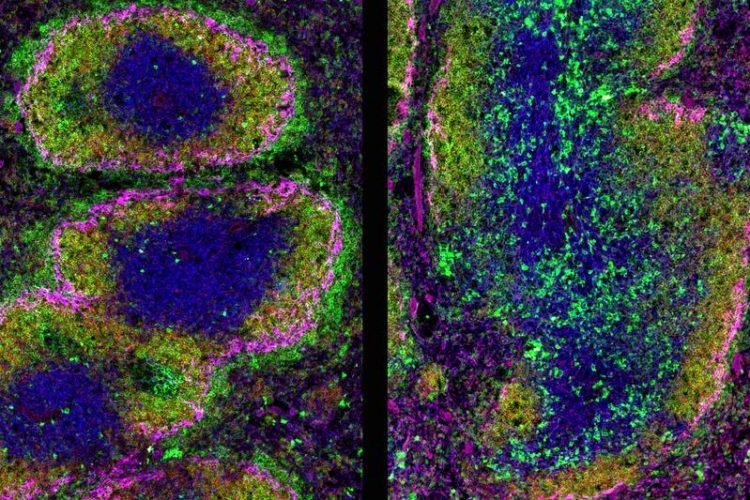Striking a balance: a mechanism to control autoimmunity

Immunofluorescence of spleen sections from 10-week-old mice IMP / W. Masselink
B cells are white blood cells that generate antibodies against an almost unlimited number of pathogens, a capacity that is vital for any higher organism. However, establishing a diverse repertoire of pathogen recognition comes at a price, as some B cells will inevitably go wild and turn against the organism’s own healthy tissue.
Such autoreactive B cells need to be silenced and are kept within the pool of B cells for emergencies, such as serious infections, for which no specific B cell can be found in the active B cell pool.
Scientists from the lab of the IMP Deputy Director Meinrad Busslinger have investigated the two antagonistic mechanisms that silence or awaken autoreactive B cells. Both mechanisms are controlled by the protein Ikaros, thereby controlling autoimmunity – as now reported in the journal Nature Immunology.
Remarkably, the starting point of the project was not autoimmunity, but an interest in how the transcription factor Ikaros may influence B cell differentiation.
Transcription factors are proteins that bind to specific parts of the DNA to activate or repress certain genes. “When you are interested in how a transcription factor works, you normally start by looking at what it does early or late in B cell development, and you can do so by selectively inactivating the factor”, says Meinrad Busslinger in explaining the chosen approach.
In the absence of Ikaros in mature B cells of mice, the scientists observed a high degree of autoimmunity. This made them turn to the two mechanisms that switch B cells on and off: “Anergy” of the B cell antigen receptor (BCR) is a tolerance mechanism that makes autoreactive B cells insensitive to self-antigens, and “Toll-like receptor (TLR)” signalling awakens B cells.
“We could show that in the absence of Ikaros, BCR anergy decreases, TLR signalling increases, and B cells become hyperactive leading to systemic autoimmunity in the animals”, says Tanja Schwickert, first author of the study, who continued to investigate how Ikaros specifically controls the two mechanisms causing these signalling defects. The results supported the main conclusion of the study: “Ikaros acts as a guardian that prevents autoimmunity.”
The research project started with the development of a mouse model to study the function of Ikaros in mature B cells in 2012. “At this point, nobody could have guessed that we will identify Ikaros as a fundamental regulator of autoimmunity”, says Meinrad Busslinger. He now considers the establishment of this link to be a case of serendipity:
“This is how basic research works – you ask a fundamental question, and you work out mechanisms with unexpected, but very far-reaching implications for all sorts of phenomena”. In this case, two mechanisms were discovered through which a single protein is sufficient to control autoimmunity.
In humans, Ikaros mutations have been identified as a risk factor for systemic lupus erythematosus (SLE), an autoimmune disease that cannot be cured and drastically shortens the life expectancy of affected patients. The present study will help to bring this condition into context of a basic mechanism that could be involved in the generation of autoimmune disease.
About the IMP at the Vienna BioCenter
The Research Institute of Molecular Pathology (IMP) in Vienna is a basic biomedical research institute largely sponsored by Boehringer Ingelheim. With over 200 scientists from 40 countries, the IMP is committed to scientific discovery of fundamental molecular and cellular mechanisms underlying complex biological phenomena. The IMP is located at the Vienna BioCenter, one of Europe’s most dynamic life science hubs with 1,800 employees from 70 countries in four research institutes, three universities and two dozen biotech companies.
meinrad.busslinger@imp.ac.at
Tanja A. Schwickert, Hiromi Tagoh, Karina Schindler, Maria Fischer, Markus Jaritz and
Meinrad Busslinger. Ikaros prevents autoimmunity by controlling anergy and Toll-like receptor signaling in B cells. Nature Immunology, doi:10.1038/s41590-019-0490-2.
https://www.imp.ac.at/news/
https://www.nature.com/articles/s41590-019-0490-2
Media Contact
All latest news from the category: Life Sciences and Chemistry
Articles and reports from the Life Sciences and chemistry area deal with applied and basic research into modern biology, chemistry and human medicine.
Valuable information can be found on a range of life sciences fields including bacteriology, biochemistry, bionics, bioinformatics, biophysics, biotechnology, genetics, geobotany, human biology, marine biology, microbiology, molecular biology, cellular biology, zoology, bioinorganic chemistry, microchemistry and environmental chemistry.
Newest articles

Superradiant atoms could push the boundaries of how precisely time can be measured
Superradiant atoms can help us measure time more precisely than ever. In a new study, researchers from the University of Copenhagen present a new method for measuring the time interval,…

Ion thermoelectric conversion devices for near room temperature
The electrode sheet of the thermoelectric device consists of ionic hydrogel, which is sandwiched between the electrodes to form, and the Prussian blue on the electrode undergoes a redox reaction…

Zap Energy achieves 37-million-degree temperatures in a compact device
New publication reports record electron temperatures for a small-scale, sheared-flow-stabilized Z-pinch fusion device. In the nine decades since humans first produced fusion reactions, only a few fusion technologies have demonstrated…





















